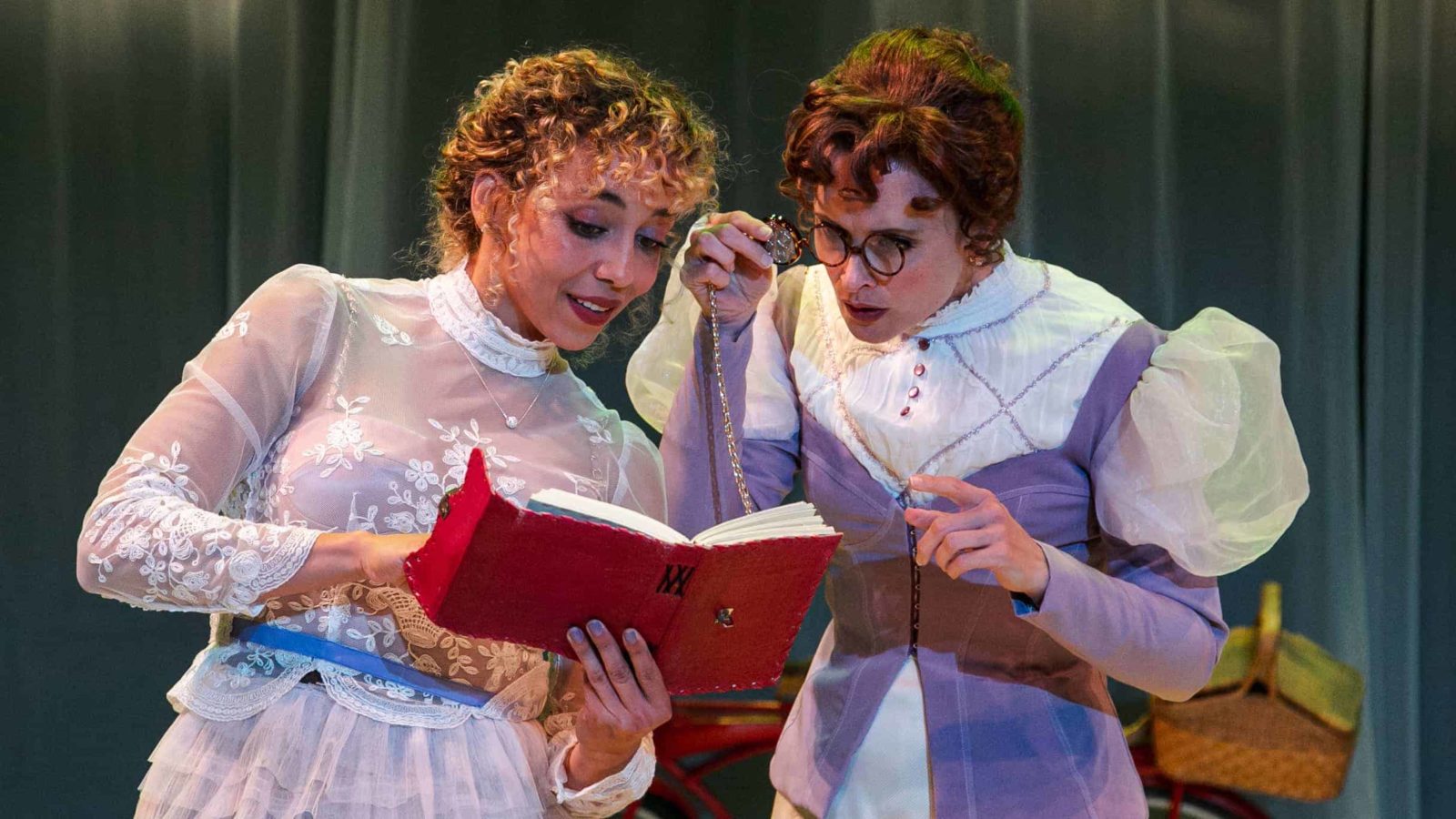Two young men are talking in a London apartment at dusk. One is sitting at a piano in his dressing gown, and one walks in dressed for a night in town. They’re well off college boys in their 20s, talking because they like to talk, enjoying their own come-backs.
They feel familiar as they banter, inventing memes short enough for Instagram stories, setting up dinner and confidently evading responsibility. It’s 1895, and The Importance of Being Earnest is open at Berkshire Theatre Group’s Unicorn Theatre.
Ot feels like another world to walk into a theater again. It’s a cool night after a bright day, and people are milling around the bar on the terrace outside the barn, looking at the menu from KJ Nosh.
We’re here for a light, ironic comedy. Two young men decide to marry and hare after the women they have chosen. Both men have lived double lives, and they get tangled in their own cover stories, and the women see cheerfully through them. It’s a night for quick repartee, one-liners and quick come-backs.
“An iridescent filament of fantasy,” the critic William Archer called the play when it was new. I enjoyed it most and found it most nuanced when I felt the characters knew what they’re saying. When Cicely is cheerfully explaining to Algy that he first proposed to her six months before they ever met, it seems clear she knows exactly how ridiculous that sounds — she’s teasing him and enjoying it.
Cicely has confidence too, and imagination, and a sense of humor — like Gwendolyn asserting she herself is always smart and never perfect: “It would leave no room for developments, and I intend to develop in many directions.”
At a glance all their talk feels quick and light. But their observations keep cutting through the froth. If you think about them for more than half a second, they often have a sad edge to them. “The good ended happily and the bad unhappily — that is what fiction means.”
This play was Wilde’s triumph. And after the last year, I can’t hear it without remembering that when it opened in London, he was about to see his life collapse. Less than two months later, he was arrested.
He had been celebrated as a playwright, internationally acclaimed. And he was about to be publicly tried and imprisoned because he was gay.
So I hear the banter and I wonder abut the man behind it. I wonder about Jack and Algernon, how they feel and how they met. They are the two people on stage who actually know each other — the only two who are friends. And they have both invented elaborate ways to get away from their families, to live the lives they want to live.
Wilde must have known how that felt. He was a confirmed Bunburyist himself. In the college library later on, I picked up Nicholas Frankel’s annotated script and learned how much of his own experiences Wilde put into the play.
Frankel traces inside jokes — Ernest’s fictional address at the Albany is the address of one of Wilde’s friends and a known leader in the gay community. Even the name Ernest comes from a contemporary love poem Wilde’s friends would have known. He was making references they would have understood and shared.
Wilde drew on his own life as much as he thought he could. In earlier drafts, Frankel says, Wilde called Algernon ‘Alfred,’ the name of the man he would be prosecuted for loving. He made references to Alfred’s mother and his own, and to his own marriage — and to censorship. Algy sends up the press for their harsh reviews and banned books.
“It’s absurd to have a hard and fast rule about what one should read and what one shouldn’t. More than half of modern culture depends on what one shouldn’t read.”
The frustration he’s touching on lightly here is central to almost every character and the ironic humor that fuels the whole work — all the ways they have to hide or encode the real parts of their lives they can’t speak about openly. They can’t speak because, as Wilde was about to prove, the world would hurt them badly if they tried. But having to hide and censor and keep silent is hurting them all along.
We can feel it in their escape routes — Cicely writing a fantasy novel in her diary, Algy assuming that every marriage is a sham, the elaborate care he and Jack have put into building their aliases, and the boredom and grim frustration they channel into crosstalk and food …
And we can hear it in their illusions and allusions, like the country reverend’s freudian slips and underhanded compliments. He calls Miss Prism Egeria — a water nymph who gave wisdom to anyone who would pour out an offering of milk or water in her sacred groves. We see them wanting. And in a comic love story that undercurrent lingers.
“The truth is never pure and rarely simple,” Algy says. “Modern life would be very tedious if it were either, and modern literature a complete impossibility.”

